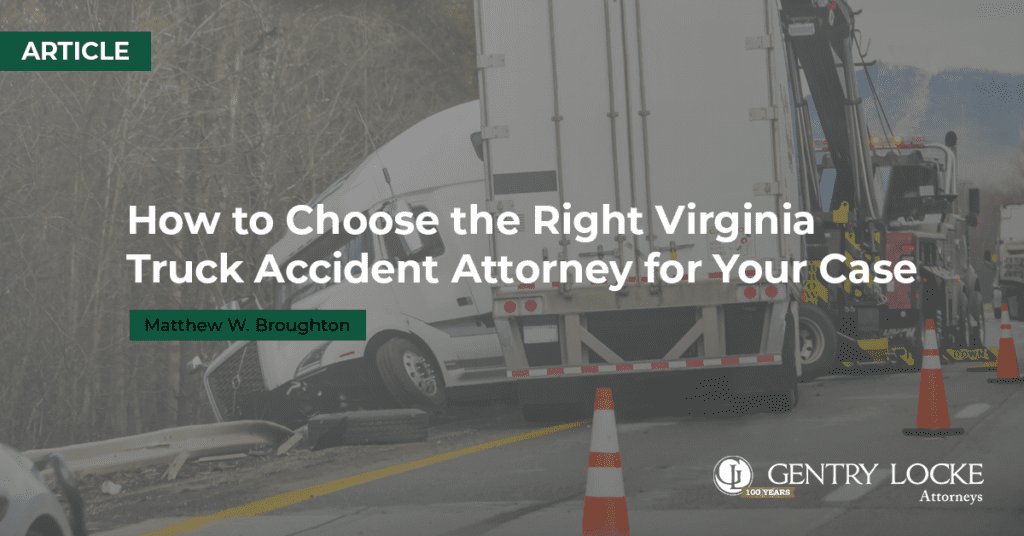How to Choose The Right Virginia Truck Accident Attorney for Your Case

If you are looking for the best Virginia personal injury attorney for your case involving a trucking accident with a tractor trailer, the following five important considerations should be made:
1. Find an experienced Virginia trucking attorney who is also a licensed (CDL) truck driver. As you might imagine, there are very few.
Why is this so important?
Tractor trailers are extremely different than other motor vehicles. A typical car may weigh a couple thousand pounds and be 12’ long. A tractor trailer, on the other hand, weighs approximately 35,000 pounds empty and up to 80,000 pounds when fully loaded.
Your average car receives a yearly inspection – whereas a tractor trailer must be given a thorough pre-trip inspection every day. [1] These inspections are designed to prevent mechanical failure which can lead to catastrophic injuries and death.
A small passenger vehicle, or even a SUV, is no match for a fully loaded tractor trailer during a collision.
A Virginia personal injury attorney who is also licensed as a CDL truck driver has an in-depth understanding of not only the operation of the truck, but also the crucial pre-trip inspection – including knowing how to identify all of the key parts of a tractor and trailer ranging from the complex air brake system to the coupling devices between the tractor and the trailer.
Operation of a tractor trailer is in no way similar to operation of a standard passenger vehicle. A tractor trailer combination is approximately 70’ in length and 8’-9’ wide. Operating such massive vehicles requires special training and experience. When a collision occurs between a passenger vehicle and a tractor trailer, you want an attorney who understands and has experience with actually operating a tractor trailer and a passenger vehicle and has had experience investigating catastrophic collisions involving these vehicles.
At some point in any lawsuit against a trucking company, there will come a day when your Virginia personal injury attorney must depose (question) the truck driver and, perhaps, representatives of the trucking company. The deposition goes much different when the attorney is also a truck driver and speaks “the language” of the trucking industry.
2. Tractor trailer accident law is complex. It is imperative that you hire someone who understands the complexities of both federal and state law as it applies to tractor trailers.
If a crash occurs in Virginia, two bodies of law apply. First, the Federal Motor Carrier Safety Administration (FMCSA) regulates “all employers, employees, commercial motor vehicles and transport property or passengers interstate commerce.” [2]
A commercial motor vehicle includes any vehicle weighing 10,100 pounds or more. [3] The Code of Regulations defines interstate commerce as “trade, traffic or transportation in the United States – (1) between a place in a state and a place outside such state . . . ; (2) between two places in a state through another state or a place outside of the United States; or (3) between two places in a state as part of trade, traffic or transportation originating or terminating outside of the United States.” [4]
Although the FMCSA rules technically do not apply to commercial vehicles operating only within a single state (Virginia) and involving solely intrastate commerce, the Virginia Administrative Code incorporates the FMCSA rules by reference with a few slight modifications. [5] Therefore, the FMCSA rules apply to a commercial motor vehicle operating in interstate or intrastate commerce within or through the Commonwealth of Virginia.
In other words, one way or another the complex Code of Federal Regulation will have an impact on any tractor trailer crash in Virginia. Knowledge of these rules is imperative to a successful outcome.
3. It is crucial that a victim or his or her family locate an attorney/lawyer in a firm with sufficient size and resources to litigate against a large trucking company.
A tractor trailer company has the advantage in almost every aspect of a crash. First, the tractor trailer driver has likely received extensive training in what to do after a crash occurs. Within minutes, a telephone call will be made to dispatch which will then send out a “quick response” team of investigators, accident reconstructionist, insurance adjusters, and perhaps even attorneys. It is rare that any representative of the occupants of a passenger vehicle know enough to immediately summon the help of an experienced trucking lawyer. If such a contact is made, it is imperative that it is made to a firm with sufficient resources to immediately dispatch a quick response team who can:
- Go to the scene of the crash;
- Involve an experienced truck accident reconstructionist;
- Preserve the evidence of the scene, vehicles, ;
- Conduct inspections of the truck, trailer and any other vehicles involved; and
- Send out a “preservation” letter to all of the potential defendants to make sure that no evidence is destroyed, altered or lost.
In other words, retaining the right attorney, with the right sized firm, will even the playing field between the trucking company and the victims or occupants of the other vehicles. The longer it takes for the victims to engage an attorney, the more risk there is that valuable evidence will be lost.
4. Hire an attorney/firm with extensive federal court experience.
Most tractor trailer accidents on a Virginia highway end up in federal court.
Cases between individuals who are residents of Virginia often litigate their claims in state court. Truck accidents often involve foreign corporations and out-of-state drivers. Consequently, there is very often “diversity” between the litigants. When this occurs, the case can be brought in federal court or removed there by the defendant even if a plaintiff files in state court. This can happen very quickly and the rules in federal court are much more strenuous and exacting than one would experience in state court.
Law firms like Gentry Locke have multiple attorneys who have extensive experience in federal court – including having clerked in federal courts at some point in their career. Knowing how to navigate the federal court system is as important as knowing how to operate a tractor trailer.
5. Hire an attorney/lawyer who is willing to let you interview a “real” past or present client who was involved in a complex tractor trailer crash.
There is a tremendous amount of knowledge to be gained by speaking with someone who had endured a lawsuit against a large corporation, such as a trucking company.
At Gentry Locke, we commonly connect our clients who have similar experiences and injuries. We have found this to be tremendously helpful to everyone in navigating what seem like an insurmountable mountain.
We also encourage our truck accident clients to reach out to the Truck Safety Coalition, which is literally composed of the prior victims of truck crashes and who are united to help guide the trucking industry toward safer rules and regulations.
Summary
Truck drivers are like any other profession. The vast majority of them are extremely professional, courteous and follow the rules and regulations of both federal and state law. However, it only takes one rogue truck driver or trucking company to destroy a family and/or its wage earner in an instant. Selecting the right attorney, in the right firm, and with the right resources will have a huge impact on the case. If you need a personal injury attorney, contact us.
[1] 49 C.F.R. § 396.13
[2] 49 C.F.R. § 390.3(a)
[3] 49 C.F.R. § 390.5.
[4] 49 C.F.R. § 390.5.
[5] See 49 C.F.R. § 390.3(a); see also 19VAC30-20-40






